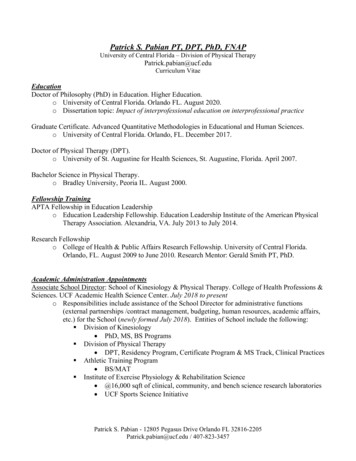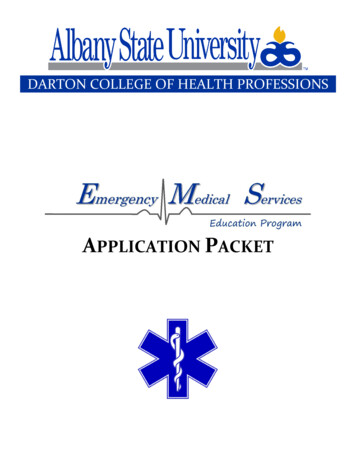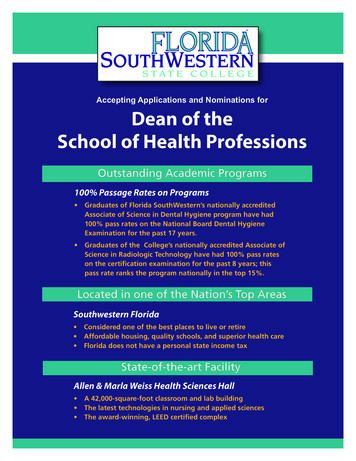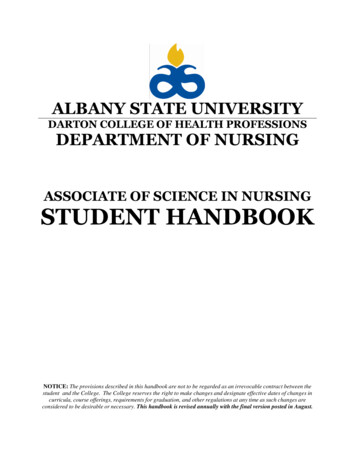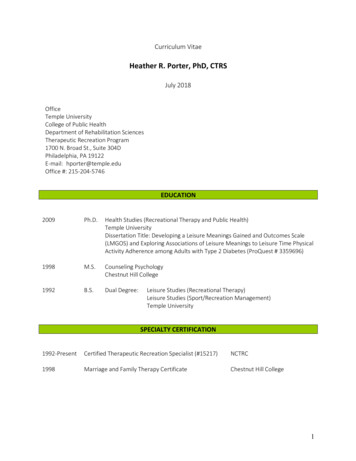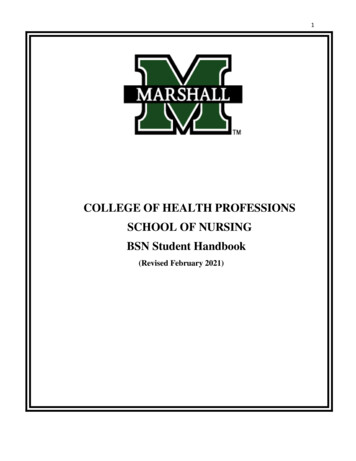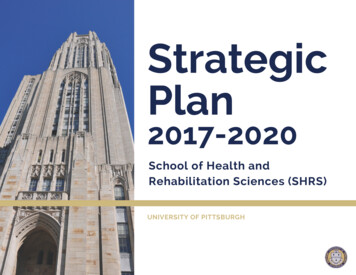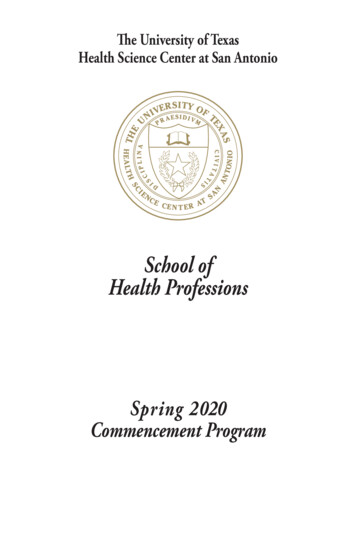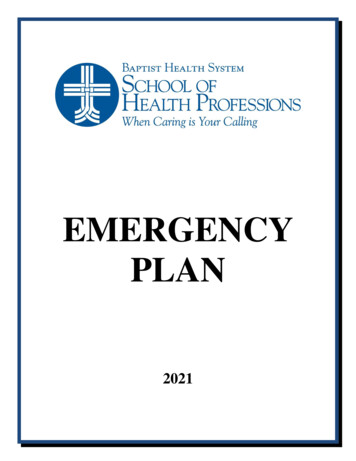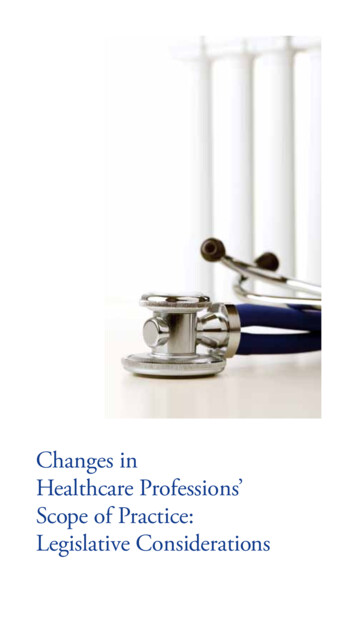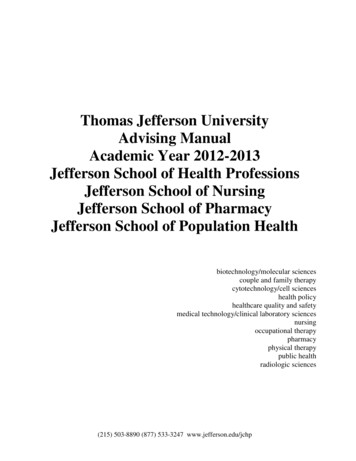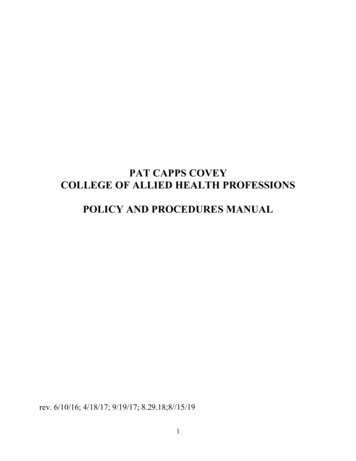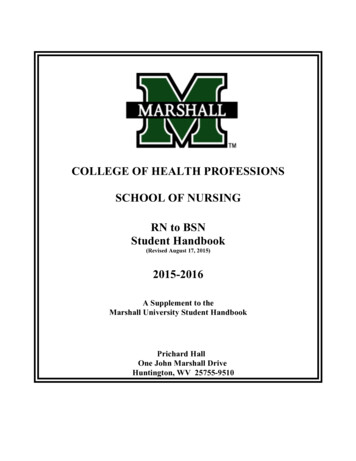
Transcription
COLLEGE OF HEALTH PROFESSIONSSCHOOL OF NURSINGRN to BSNStudent Handbook(Revised August 17, 2015)2015-2016A Supplement to theMarshall University Student HandbookPrichard HallOne John Marshall DriveHuntington, WV 25755-9510
This handbook is developed for students entering the College of HealthProfessions, School of Nursing, Registered Nurse to Bachelor of Science inNursing (RN to BSN) program.Students are expected to read the Marshall University Catalog and theMarshall University Student Handbook in order to be familiar withUniversity policies.The Bachelor of Science in Nursing Program is accredited by the:Accreditation Commission for Education in Nursing or ACEN(formerly known as the NLNAC)3343 Peachtree Road NE, Suite 850 Atlanta, Georgia 30326acenursing.org (404) 975-50002
TABLE OF CONTENTS 2015-2016TOPICPAGECollege of Health Professions, School of Nursing Faculty and Staff DirectoryImportant Phone Numbers: Marshall University4-56Academic Calendar of Events: Fall 2015-Spring 20167-12Marshall University Mission Statement13College of Health Professions Mission StatementMarshall University Policy for Students with Disabilities1313Marshall University Incomplete Grade and Withdrawal Policy14Marshall University Dropping Course Information15-16Marshall University Transfer Credit16-17BSN Program Objectives17School of Nursing Admissions Policy18Social Justice Policy StatementSchool of Nursing Statement of Philosophy1819-20School of Nursing Academic Policies and Information Academic Dishonesty Policy Failing Grade Policy Original Work Policy Anti-plagiarism Software Policy BSN Online Exam/Quiz Policy BSN Online Policy for Late Assignments Academic Appeals SON Communication Policy Use Electronic/Social Media Policy E-mail accounts for studentsRN to BSN Academic Policies and Information Withdrawal RN to BN Program Delay of Admission Policy Inactive Student Policy Leave of Absence Policy RN to BSN Policy of Transfer Credit Nursing Courses Submission of AssignmentsComputer RequirementRN to BSN Student Health Policies Injury in a Clinical Setting (project based experience) Policy Drug and Alcohol Testing Policy Appearance PolicyRN to BSN Required Records Health Form RN to BSN CPR Verification Policy Immunization Requirements Including TB Testing Technical Standards Form Clinical Background Check/Drug ScreenRN to BSN Other Requirements ID Badge Marshall University OrientationRN to BSN Student Organizations Student Nurses Association Nurses Christian Fellowship Sigma Theta Tau-Nu Alpha Chapter Nursing Honor Society21-25326-2728-3031-343434-35
RN to BSN Program Academic Information Additional Hours of Credit for Associate Degree/Diploma Criteria for Admission RN to BSN Nursing Course Descriptions Plans of Study for Nursing Courses General Education Requirements Plan of StudyGraduationRecognition Ceremony35-3839COLLEGE OF HEALTH PROFESSIONSDEAN’S OFFICE/ADMINISTRATIONPrichard Hall - (All phone numbers are area code 304)DeanDr. Michael W. PrewittPH 224, 696-5270prewittm@marshall.eduDr. Gary McIlvainAssociate Dean of Student AffairsGullickson Hall 108, 696-2930mcilvain2@marshall.eduDr. William PewenAssociate Dean of ResearchPH 218, 696-3743pewen@marshall.eduStaffCathy LawsonBusiness Manager IPH 224, 696-3765lawsonc@marshall.eduMarilyn FoxDirector Student ServicesPH 221, 696-2620foxm@marshall.eduSharon PetersSenior Records OfficerPH 216, 696-5270peters@marshall.eduJonathan BrownDirector, Media CenterPH 111B, 696-2629brownj@marshall.eduKelli PriceStudent AdvisorPH 214, 696-2618billiupsj@marshall.eduCarolyn MassieStudent AdvisorPH 216, 696-3145massiec@marshall.eduRick RogersAdministrative AssociatePH 224, 696-2624bailey159@marshall.eduKathy VanderpooleAdministrative AssociatePH 224, 696-3655vanderpoolek@marshall.edu4
SCHOOL OF NURSING FACULTYAdministrationDr. Denise Landry, ChairProfessorPH 425, 696-2630landry@marshall.eduDr. Rebecca AppletonProfessorPH 420, 696-2632appleto1@marshall.eduDr. Debra GreeneAssociate ProfessorMOVC 674-7205greene35@marshall.eduSusan BootonAssistant ProfessorPH 413A, 696-2622booton9@marshall.eduDr. Susan ImesAssociate ProfessorPH 402, 696-2619imes@marshall.eduDr. Joy ClineAdjunct Professorclinejoy@marshall.eduKlara KovacsInstructorPH 416, 696-3298kovacsk@marshall.eduDr. Nancy ElkinsAssistant ProfessorPH 413B, 696-2617elkinsn@marshall.eduJessica MaynardAssistant ProfessorPH 404, 696-2628Maynard207@marshall.eduAshlee GallionAssistant ProfessorPH 320, 696-2621Lantz11@marshall.eduDr. Paula ReillyAssociate ProfessorPH 419, 696-2626woodburnp@marshall.eduDr. Lisa RamsburgAssociate ProfessorPH 322, 696-2453kruzan1@marshall.eduDr. Diana StottsDirector of Graduate ProgramProfessorPH 424 696-2623stotts@marshall.eduDr. Lynda TurnerDirector of UndergraduateProgramAssociate ProfessorPH 323, 696-2637turner44@marshall.eduDr. Robin WaltonProfessorPH 417, 696-2634walton@marshall.eduDr. Deanna PopeAssociate ProfessorMOVC, 674-7237/696-7237evansd@marshall.eduDr. Sandra PruntyDirector RN to BSN ProgramProfessorPH 409, 696-2627prunty2@marshall.eduDr. Susan WelchAssociate ProfessorPH 410, 696-2631welchs@marshall.eduDr. Jeanne WidenerAssociate ProfessorPH 318, 696-2638widenerj@marshall.eduStaffTammy WorkmanAdministrative Secretary SeniorPH 425, 696-5272workmant@marshall.eduPH Prichard HallBrandi WaitersStudent Records AssistantPH 421, 696-3821mailto:waiters1@marshall.eduMOVC Mid Ohio Valley Center5
MARSHALL UNIVERSITYIMPORTANT PHONE NUMBERSAdmissions Office1-800-642-3463African-American StudentsProgramBursar’s Office-696-3160696-6705student payment696-6620Counseling Services696-3111Drinko Library696-2320Financial Aid1-800-438-5390MU Athletic Ticket Office696-3162696-4373MU Bookstore1-800-547-1262696-2461MU Bookstore - 406Public Safety/Security696-4357Registrar’s Office696-6410Student Affairs Office696-6422Student Government696-6435Student Health696-7173Student Legal Aid Center696-2285Student Residence Life1-800-438-5391Tutoring Services696-6765696-66226
Academic Calendar Fall 2015August 17, Monday -- August 21, FridayRegistration/Schedule AdjustmentAugust 24, Monday, 8:00 a.m.First day of classesAugust 24, Monday -- August 28, FridayLate registration/schedule adjustment (add-drop)August 28, FridayLast day to add a classAugust 31, Monday"W" Withdrawal period beginsSeptember 5, Saturday -- September 7, MondayUniversity computing services unavailableSeptember 7, MondayLabor Day Holiday- University ClosedSeptember 18, FridayApplication for December graduation due in academic dean's officeSeptember 25, FridayLast Day to Drop 1st 8 Weeks CoursesOctober 5, MondayFinal draft of thesis/dissertation delivered to committee chairOctober 12, MondayMid-Term, 1st 8 weeks courses endOctober 13, Tuesday2nd 8 weeks courses begin7
October 15, Thursday, NoonFreshmen/Sophomore midterm grades dueOctober 26, MondayStudents should schedule appointments with advisorsto prepare for advance registration.(Required for students who have mandatory advising holds)October 30, FridayLast day to drop a full semester individual courseNovember 2, MondayRecommended date to apply for May graduationNovember 2, Monday - December 6, FridayComplete withdrawals onlyNovember 9, Monday - November 20, FridayAdvance registration for spring semester (open only to currently enrolled students)November 13, FridayLast day to drop 2nd 8 weeks coursesNovember 23 - MondayAdvance registration for spring semester (open to admitted and readmitted students)November 23, Monday - November 28, SaturdayThanksgiving Break/Classes dismissedNovember 26, Thursday - November 27, FridayThanksgiving Holiday/University closedNovember 30, MondayClasses resumeNovember 30, Monday -- December 4, Friday"Dead week"8
December 4, FridayLast class day; Last day to completely withdraw from fall semesterDecember 5, SaturdayExam day for Saturday classes/Some common finalsDecember 7, MondayExam dayDecember 8, TuesdayExam dayDecember 9, WednesdayStudy DayExams resume at 3:00 p.m. for Wednesday evening classesDecember 10, ThursdayApproved Thesis/Dissertation must be submitted to the EDT websiteElectronic Thesis and Dissertation form and graduation fee receipt submitted to the GraduateCollege OfficeDecember 10, ThursdayExam DayDecember 11, FridayExam dayDecember 12, Saturday, 11:00 a.m.Winter Commencement, Big Sandy Superstore ArenaDecember 13, Sunday, NoonResidence halls closeDecember 14, Monday, NoonFinal Grades dueDecember 22, Tuesday, 5:00 p.m.University Closes9
December 23, Wednesday - January 1, FridayWinter break, University closedDecember 29, Tuesday - December 30, WednesdayStudent Service Offices Open 10:00 a.m. -- 4:00 p.m.(Admissions, Bursar, Financial Aid, Registrar, Student Resource Center)Spring 2016January 4, 2016, MondayUniversity reopensJanuary 4, Monday -- January 8, FridayRegistration/Schedule adjustmentsJanuary 11, Monday, 8 a.m.First Day of ClassesJanuary 11, Monday -- January 15, FridayLate registration/schedule adjustment (add-drop)January 15, FridayLast day to add a classJanuary 18, MondayMartin Luther King, Jr. Holiday - University closedJanuary 19, Tuesday"W" Withdrawal period beginsFebruary 5, FridayApplications for May graduation due in dean’s officeFebruary 12, FridayLast day to drop 1st eight weeks coursesFebruary 22, MondayFinal draft of thesis/dissertation delivered to committee chairMarch 2, WednesdayMidterm, 1st 8 weeks courses endMarch 3, Thursday2nd 8 weeks courses begin10
March 7, Monday, NoonFreshmen/Sophomore mid-term grades dueMarch 14, MondayStudents should schedule appointments with advisors to prepare for advanceregistration for summer and fall. (Required for students with mandatory advising holds.)March 18, FridayLast day to drop an individual courseMarch 19, Saturday, NoonResidence halls closeMarch 21, Monday -- March 26, SaturdaySpring Break/Classes dismissedMarch 21, Monday -- April 29, FridayComplete withdrawals onlyMarch 27, Sunday, 9 a.m.Residence halls reopenMarch 28, MondayClasses resumeMarch 28, MondayRecommended date to apply for December 2016 graduationMarch 28, Monday -- April 1, FridayAdvance registration for summer sessions (open only to currently enrolled students)April 4, MondayAdvance registration for summer sessions begin (open to admitted/readmitted students)April 11, Monday -- April 22, FridayAdvance registration for fall semester (open only to currently enrolled students)April 12, TuesdayLast day to drop a 2nd 8 weeks coursesApril 25, MondayAdvance registration for fall semester begins (open to admitted/readmitted students except firsttime fall undergraduates)April 25, Monday -- April 29, Friday"Dead Week"11
April 29, FridayLast class dayLast day to completely withdraw from spring semesterApril 30, SaturdayExam day for Saturday classesSome common finalsMay 2, MondayExam DayMay 3, TuesdayExam DayMay 4, WednesdayStudy DayExams resume at 3 p.m. for Wednesday evening classesMay 5, ThursdayExam DayMay 5, ThursdayApproved Thesis/Dissertation must be submitted to the EDT websiteElectronic Thesis and Dissertation form and graduation fee receipt submitted to the GraduateCollege OfficeMay 6, FridayExam DayMay 7, Saturday, TBD at Big Sandy Superstore ArenaCommencementMay 8, Sunday, NoonResidence halls closeMay 9, Monday -- August 12, FridaySummer School SessionsMay 10, Tuesday, NoonFinal Grades due12
MARSHALL UNIVERSITYMission StatementMarshall University is a multi-campus public university providing innovative undergraduate andgraduate education that contributes to the development of society and the individual. The Universityactively facilitates learning through the preservation, discovery, synthesis, and dissemination ofknowledge.Marshall University will: Provide affordable, high quality undergraduate and graduate education appropriatefor the state and the region; Provide services and resources to promote student learning, retention, and academicsuccess; Foster faculty staff, and student outreach through service activities; Provide a safe and secure employee work environment; Make instruction available throughout Marshall’s service area using all appropriatemodes of delivery. Enhance the quality of health care in the region; Promote economic development through research, collaboration, and technologicalinnovations; Educate a citizenry capable of living and working effectively I a global environment; Support and strengthen the faculty, staff, student, and administrative governancestructures in order to promote shared governance of the institution; Further the intellectual, artistic, and cultural life of the community and region; and Adhere to the Marshall University Creed and to the Statement of Ethics.Revised: 02/04Revised: 02/03COLLEGE OF HEALTH PROFESSIONSMission StatementConsistent with the mission of Marshall University, the College of Health Professions iscommitted to offering quality undergraduate and graduate nursing education. The focus of the College ofHealth Professions is upon being interactive with the community in assessing the health care needs of thepeople, including rural and underserved areas, and in responding to contemporary and future needs ofsociety and the nursing profession.To accomplish this mission, the College of Health Professions: Ensures the integrity of the programs through maintenance of rigorous professional educationstandards and through the high expectation of student learning and performance.Encourages involvement of faculty in service to society and the profession.Supports the engagement of faculty in research and scholarly activities.Provides an environment that is sensitive to a culturally, racially, and ethnically diverse student body,faculty, and staff; andMaintains an environment that provides for academic freedom and shared governance.13
Marshall University Policy for Students with Disabilities“Marshall University is committed to equal opportunity in education for all students, includingthose with physical, learning and psychological disabilities. University policy states that it is theresponsibility of students with disabilities to contact the Office of Disabled Student Services(DSS) in Prichard Hall 117, phone 304 696-2271 to provide documentation of theirdisability. Following this, the DSS Coordinator will send a letter to each of the student’sinstructors outlining the academic accommodation he/she will need to ensure equality inclassroom experiences, outside assignment, testing and grading. The instructor and student willmeet to discuss how the accommodation(s) requested will be provided. For more information,please visit http://www.marshall.edu/disabled or contact Disabled Student Services Office atPrichard Hall 117, phone 304-696-2271.”Received from University: 1/09Marshall University Incomplete Grade and Withdrawal PolicyIncomplete: The grade of I (incomplete) indicates that the student has completed three-quartersof the course, as determined by the instructor, but cannot complete the course for a reason thataccords with the university excused absence policy. For courses (traditional or online) that do ordo not have a defined absence policy, it is determined by the instructor to issue the I grade.Students must be in good standing (for example a C grade or better) in the class prior torequesting an incomplete. The course instructor decides whether or not an incomplete will begranted and specifies in writing on the university incomplete grade form what work the studentmust complete to fulfill the course requirements. The student has until the end of the next fall orspring semester from the date of receipt of the incomplete grade in which to complete the course,or the instructor may establish an earlier deadline. If special circumstances exist, which preventthe student from completing the course in the prescribed time, the incomplete may be extendedwith the written approval of the instructor, the instructor’s chair or division head, and theinstructor’s dean noting the time period for the work to be completed. If the student satisfactorilycompletes the course in the prescribed time he/she will receive a letter grade. If the student failsto complete the course requirements during the stipulated time, the grade of I changes to a gradeof F, NC, or U, depending on the type of grade appropriate for the course. All grades remain onthe student’s permanent record as originally submitted by the course instructor, except for Igrades that have been completed and changed by the instructor. Any grade change is added to thepermanent record. In the event that the faculty member leaves the institution or is no longeravailable, the disposition of incomplete grade or grades is the responsibility of the chair, thedean, or the provost. If the chair is unavailable, the responsibility falls on the dean; if the dean isunavailable the responsibility goes to the provost. The decision will be made in consultation withthe faculty in the appropriate discipline.・ W (Withdrew): If a student drops courses during the Withdrawal period (which lasts until thetenth Friday after the first week of the regular semester), or withdraws completely from theuniversity through the last day of class, he/she will receive a W. For eight week courses, summersession courses, and other courses of varying lengths, the W period ends the Friday immediatelyfollowing the two thirds point in the course. Exact W dates are published in the annual UniversityAcademic Calendar. The W (withdrew) has no impact on the Grade Point Average. (Please beaware that withdrawing from a course may change a student’s status from that of full-time to14
part-time student—a full-time student is enrolled for 12 hours or more. Part-time status couldnegatively affect financial aid, athletic participation, or health insurance eligibility.)Taken from the MU 2014-2105 Undergraduate CatalogDropping CoursesDropping All Courses (Withdrawal from the University): 2015-16 Undergraduate CatalogAcademic Information pages 90-91Final Date: Last Day of ClassThe last date for complete withdrawal from the university is the last day of class. Withdrawalfrom the university is defined as dropping all classes for which a student is registered. Thestudent must submit a withdrawal form to the Registrar or mail a request for withdrawal to theRegistrar. The effective date of withdrawal is the date that the withdrawal form issubmitted to the Registrar. The postmark on mail requests is the official date of withdrawal.Grades Assigned for Withdrawal from the UniversityStudents withdrawing from the university receive a grade of W for all courses. The W grade(withdrew) has no impact on the Grade Point Average. Students who withdraw from theuniversity improperly, or who do not follow the regulations described here, receivegrades of F at the end of the semester or term.Dropping Individual Courses 2015-16 Undergraduate Catalog Academic Information page 91Final Date: Tenth Friday in a Regular Term Day classes: Students can drop individual courses after the Schedule Adjustment period andduring the Withdrawal period which lasts until the Friday of the tenth week of class during aregular semester. The exact last day for dropping individual courses is always published in theAcademic Calendar for any given semester or term. A student must get a “Schedule Adjustmentand Class Drop Form” from the Registrar’s Office, fill in the required course drop information,and then obtain the signature of the course instructor. If a student is on academic probation,he/she must also get the approval and signature of the associate dean of his/her college and bringthe completed form to the Registrar’s Office. E-Course Withdrawal Period: The withdrawal policy for e-courses parallels that for regularcourses. A student can withdraw from an individual e-course through 2/3 of the official courselength. After that time, only a complete withdrawal from the university is allowed. The refundpolicy for e-courses also parallels that of regular courses. Night or Off-Campus classes, or E-Courses: Students can drop a night class, an off-campusclass, or an e-course by mailing a request to drop to the Registrar. The postmark on the requestwill be the official date of withdrawal. The instructor’s signature is not required. If a student ison academic probation, he/she must have the approval signature ofhis/her associate dean. High-demand course: If a student drops a “high-demand” course during the Withdrawal period,he/she will not be able to pre-register for the course for the following semester. High-demandcourses include:・ ACC 215・ BSC 227・ ENG 101, ENG 102・ MTH 121, 127, 13015
・ SPN 101, SPN 102Students can obtain an up-to-date listing of high-demand courses from the Office of theRegistrar.Grades Assigned for Dropping Individual CoursesA student dropping courses or withdrawing from the university during the Withdrawal period(which lasts until the tenth Friday after the first class day of the regular semester), will receive agrade of W. For eight week courses, summer sessions and other courses of varying lengths, thewithdrawal period ends the Friday immediately following the two thirds point in thecourse. Exact withdrawal dates are published in the annual University Academic Calendar. TheW grade (withdrew) has no impact on a student’s Grade Point Average.Students who drop courses improperly, or who do not follow the regulations described here,receive a grade of F at the end of the semester or term.Transfer Credit 2015-16 Undergraduate Catalog Academic Information page 100・ New Students:When a student applies for admission to Marshall University, the Admissions office willdetermine the acceptability of credits earned at other institutions.・ Enrolled Students:After enrollment as a regular undergraduate at Marshall, if a student plans to take courses atanother institution he/she must have prior approval from the dean of his/her college if the studentwants those courses to count towards his/her degree requirements at Marshall. The studentshould pick up an off-campus form (“Approval of Courses to be Takenfor Advanced Standing”)from the Admissions Office or his/her college office. After filling in the name of the visitinginstitution as well as the exact courses the student wishes to take there, the student takes the formto the Admissions Office. The Admissions staff will convert the proposed coursework intoequivalent Marshall courses and will then send the form to the student’s college office forreview. The associate dean will approve the application if the proposed courses areappropriate for the student’s degree requirements. The form is then forwarded to the Registrar.The Registrar will send the student a copy of the completed form.・ Courses students take without prior approval may be rejected when they are evaluated fordegree requirements.・ Before the credit earned at another institution can be transferred and recorded on thepermanent academic record atMarshall, the student must have an official transcript forwardedfrom the other institution to the Marshall Admissions Office.・ Coursework taken at another institution transfers at the level at which it was taken. This issomething important to consider because undergraduate degree students must have a minimumnumber of hours of upper division credit to graduate. The exact number of required upperdivision hours is determined by the student’s college.・ Grades earned for coursework taken at other institutions are computed into the overall GPA,(includes courses taken atMU and other institutions), but have no impact on the Marshall GPA (except grades earnedunder the D/F Repeat Rule).・ Courses taken through the Study Abroad office require a different form and process. Pleasesee the Study Abroad section of this catalog.16
Appeal of Denial of Transfer Credit, or Course Equivalency Determination, or CourseSubstitution - 2015-16 Undergraduate Catalog Academic Information page 100Students may appeal decisions on how transfer credits are evaluated. The MU UndergraduateAdmissions Office determines transferability of credits and course equivalency at the time ofadmission. Once admitted, if a student believes the proper equivalent credit has not beenawarded, the student should request, in writing, an explanation of credit denial from the Office ofUndergraduate Admissions. This initial step must be taken within thirty (30) days of receipt ofthe transfer credit evaluation or within ten (10) instructional days of the beginning of thestudent’s matriculating term, whichever comes first. The Office of Undergraduate Admissionswill review the request for technical errors and issue a written response within ten (10) days.BACHELOR OF SCIENCE OF NURSINGPROGRAM OBJECTIVESThe graduate is a nurse generalist with competence to: Use the nursing process to provide nursing care to individuals, families, groups, andcommunities in multiple settings, considering cultural diversity. Synthesize theoretical and empirical knowledge from nursing, natural and social sciences,and the humanities to promote, maintain, and restore health throughout the life span. Promote health care through communication and collaboration with clients and otherhealth care providers. Coordinate comprehensive nursing care through the application of management andleadership skills, including prioritizing and delegation of care. Use clinical and critical reasoning to address simple and complex situations. Integrate evidence-based practice into nursing care. Perform as a responsible and accountable member of the profession who practicesnursing legally and ethically. Examine professional activities that help define the scope of nursing practice, set healthpolicies and improve the health of the public.Revised SON 5/08/2012Revised SON 02/04Reviewed SON 02/03Revised SON 2/26/01Revised SON Faculty 5/11/9317
SCHOOL OF NURSINGAdmission PolicyIt is the policy of Marshall University to provide equal opportunities to all prospectiveand current members of the student body on the basis of individual qualifications and meritwithout regard to race, color, sex, religion, age, handicap, national origin, or sexual orientation.All students must be physically and emotionally able to meet the requirements of eachnursing course, and, therefore, the requirements of the nursing program. Consistent withapplicable statutes, the School of Nursing will make every effort to make reasonableaccommodations in its course delivery to insure that students with disabilities receive equaltreatment.During the course of the nursing education program, students may be exposed topotentially infectious situations. Students with or who develop compromised health statusshould discuss their health risks with their health care provider.Revised: 02/04Revised: 02/03Revised: SON 2/26/01Approved: SON Faculty 1/26/93SCHOOL OF NURSINGSocial Justice Policy StatementMarshall University is committed to bringing about mutual understanding and respectamong all in individuals and groups at the University. As part of Marshall University, theCollege of Health Professions, School of Nursing has made a commitment to social justice.Therefore, no one will be discriminated against on the basis of race, gender, ethnicity, age,sexual orientation, religion, social class, or differing viewpoints. Each student will be viewed asa valuable member of this class and as the faculty for the course I will strive to facilitate anatmosphere/learning environment where mutual understanding and respect are actualized.Approved SON 02/27/0618
MARSHALL UNIVERSITYSCHOOL OF NURSINGSTATEMENT OF PHILOSOPHYPERSON/ENVIRONMENTThe person is a holistic being; an individual who is complex, dynamic, and cannot be reduced tothe sum of his/her parts. Each person has values, attributes, and behaviors that are influenced byenvironment, culture, social norms, experiences, physical characteristics, moral and ethical constructs,and religious beliefs and practices. The person is viewed as a system interacting with the environmentand developing relationships with others. The person is capable of growth and development, selfdirection, change and goal directed behavior. Each person is diverse and unique in nature and should berecognized as such. Diversity may occur in, but is not limited to, race, gender, ethnicity, sexualorientation, age, socioeconomic status, religious beliefs, political beliefs, and physical abilities. Eachperson deserves respect and dignity.HEALTHHealth is a dynamic process which has variations along a wellness/illness continuum throughoutthe lifespan. Wellness is the highest functional potential for holistic well-being. Illness incorporates anyalteration in health which produces dysfunction or a potential alteration in the individual. Perceptions ofhealth are determined by society and by the person. Health is influenced by heredity, environment, andlifestyle. Individuals ultimately have the right and responsibility to make decisions and set goalsconcerning their health.NURSING“Nursing is the protection, promotion, and optimization of health and abilities, prevention ofillness and injury, alleviation of suffering through the diagnosis and treatment of human response, andadvocacy in the care of individuals, families, communities, and populations.” (ANA, 2010, p. 3) Nursinginvolves integration of many values including caring, diversity, integrity, holism, patient-centeredness,and excellence. Caring is the essence of nursing and can be described as the act and expression ofcompassion and concern towards others to promote a sense of health and well-being. Diversity isintegrated into nursing through recognition and acceptance of unique and individual differences and thebeliefs, values, gender, race, and ethnicities among individuals and communities. Nursing practicedemonstrates integrity through adherence to moral and ethical principles, respecting the dignity of othersand providing honest and t
RN to BSN Student Handbook (Revised August 17, 2015) 2015-2016 . Marshall University Orientation 34 RN to BSN Student Organizations . PH Prichard Hall MOVC Mid Ohio Valley Center Dr. Rebecca Appleton Professor PH 420, 696-2632 appleto1@marshall.edu
